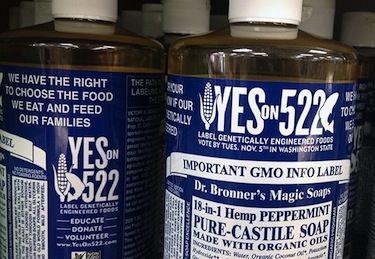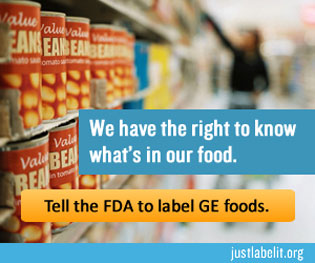
GMO labeling advocates have used the education-based "consumer's right to know" campaign strategy twice, in 2012 and 2013. They failed both times, in California and Washington State, with similar splits: 52% to 48% and 51% to 49%, respectively. If enacted, the rule would have mandated labeling of GMO products. Does this mean that people don't want to know what's in their food?
(The Grocery Manufacturers Association, along with Monsanto, were major funders of the Washington anti-labeling campaign.) Maybe many consumers believe they're getting enough "nutrition" information on existing labels and another one need not be added. Have we irrevocably turned ourselves into "pigs at the trough," as this satirical video from The Onion suggests? Is it too late? The Washington advocacy group Yes on I-522 blames the latest defeat, in its state, on the lowest turnout ever, which also consisted of mostly older, conservative voters in an off election year. 2016, a presidential election year, will be different, they say, with a bigger turnout and younger, more engaged voters casting ballots. Really? Or is it a fundamental flaw in their advertising that's not getting them the few percentage points they need to win? Planet Waves reader Ann Kreilkamp last week sent us a link to a recent blog by John Rappoport, a Pulitzer Prize-nominated investigative reporter and author, in which he rails against those funding the pro-labeling side -- Gary Hirshberg (Stonyfield Organic), Grant Lundberg (Lundberg Family Farms), David Bronner (Dr. Bronner's Magic Soaps), and Joe Mercola (mercola.com), and others. He admonishes them to get mad as hell, tell people that Monsanto's practices are deadly and evil, and stop being so civil in their ads. "Are they afraid to go after Monsanto directly because they believe their own businesses would suffer the consequences?" Rappoport asks. "If so, tell us. Open up. We can help. A large group of vocal and outraged supporters could help forestall those consequences. That would be a hell of a fight and the public would see, up close and personal, corporate and government criminals trying to silence good men."
"There are some in the pro-labeling movement who are so relentlessly New Age and childishly 'positive,' they're terrified of 'going negative.' They think The Universe will punish them for it. They'll tell you that 'negative' ads would turn off voters. "But the history of politics doesn't say that. Negative ads work if they're done right. "The truth is, there's a sound barrier out there, and it has to be broken if Monsanto is going to be stopped from taking over 95% of U.S. farm land with its heinous GMOs forever." So is Rappoport right? Would an angry, evidence-based, negative ad campaign work in which people heard the plain truth about Monsanto and GMOs? Most Americans have never heard any of it before, and way more than two or three percent might be shocked enough to cast a Yes vote and pass a mandatory labeling law with teeth. Then, if they were really infuriated, they might go out and do the true heavy lifting -- confronting the USDA, the FDA, and Congress for their complicity in Monsanto's poisonous practices. It's worth a try. To unsubscribe, click here e Wiki | Friends | Editors | Contact Us Copyright © 2013 by Planet Waves, Inc. All Rights Reserved. Other copyrights may apply. Some images used under Fair Use or Share Alike attribution. |

